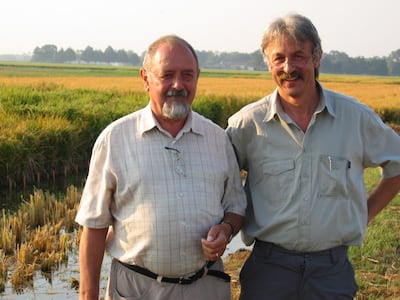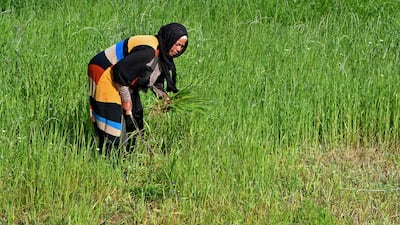Imagine there was a superfood that could potentially save more than one million lives every year, as well as stopping hundreds of thousands of children going blind. The good news is that it exists. It’s called “golden rice”.
The bad news is that the best current chance to get the crop into cultivation and ultimately to reach the people whose life-chances it could alter has just been blown, after a court in the Philippines ruled that it could not be commercially grown in the country.
A spokesperson for Greenpeace South-East Asia, which had been campaigning for the ruling, said it was “a monumental win for Filipino farmers and Filipino people who have for decades stood up against genetically modified crops”. She went on to claim that “GM crops have never been proven safe, and have hindered necessary progress on climate-resilient ecological agriculture that keeps the control of seeds on our farmers”.
The executive secretary of the golden rice Humanitarian Board, Adrian Dubock, put it differently. Calling the court’s decision “extremely alarming”, he said “planting golden rice was not being done for profit. Nobody was trying to control what farmers grow or control what people eat. It was being done to save lives”.
golden rice was invented for a purpose. Vitamin A deficiency is what causes the deaths and blindness I mentioned above, and it severely affects areas in Africa and Asia where many subsist on little more than bowls of rice. That’s a problem since normal rice plants do contain beta carotene – which the human body converts into Vitamin A – but not in the parts we eat. So two scientists, Ingo Potrykus of the Swiss Federal Institute of Technology and Peter Beyer of the University of Freiburg, spent eight years in the 1990s working out how to genetically engineer a form of rice that had beta carotene in the edible grain. golden rice – so called after its colour – was the result.

Years of testing and trials followed. In 2018, the US and Canada approved golden rice safe for human consumption, and the following year the Philippines – where a government survey found 15.5 per cent of under six-year-olds suffered from Vitamin A deficiency – followed suit. In 2021, it became the first country to give the official go-ahead for commercial cultivation of the crop, but a series of legal challenges led to last month’s decision to revoke the biosafety permits that had been granted to the University of the Philippines Los Banos and the Philippine Rice Research Institute.
One of the reasons why the crop is not already in mass production is, as Ed Regis, author of golden rice: The Imperiled Birth of a GMO Superfood, wrote, “every aspect of golden rice development – from lab work to field trials to screening for ‘regulatory clean events’ – was entangled in a byzantine web of rules, guidelines, requirements, restrictions, and prohibitions”. This was partly a result of a highly cautious protocol adopted by more than 100 countries in 2000 to ensure populations were protected from any possible risks “resulting from modern biotechnology”.
But persistent myths about “franken-foods” have played a part, too.
I once commissioned an essay on this by the American molecular biologist Nina Fedoroff, who was science and technology adviser to two US secretaries of state, Condoleezza Rice and Hillary Clinton. “We humans have been genetically modifying plants to provide our food for more than 10,000 years,” she wrote. “Most of today’s food crops have radiation or chemical mutagenesis in their pedigrees. Curiously, nobody worried about or regulated the changes they couldn’t see.”
It was the specific science involving cloning and sequencing developed towards the end of the last century that provoked what many scientists consider to be unreasonable hysteria.
“Amazingly, only plants modified using molecular techniques are called GM today,” wrote Prof Fedoroff. “Almost everyone believes we’ve never fiddled with plant genes before – as if Ruby Red grapefruit, beefsteak tomatoes and elephant garlic were ‘natural’ and not our very own creations.”
In 2016, a list of 168 Nobel Laureates (mostly in chemistry, physics and medicine) issued an open letter, titled “To the Leaders of Greenpeace, the United Nations and Governments around the world”. In it, they said: “Scientific and regulatory agencies around the world have repeatedly and consistently found crops and foods improved through biotechnology to be as safe as, if not safer than those derived from any other method of production. There has never been a single confirmed case of a negative health outcome for humans or animals from their consumption. Their environmental impacts have been shown repeatedly to be less damaging to the environment, and a boon to global biodiversity.”
The laureates supported golden rice. They said it could reduce or eliminate much of the death and disease caused by Vitamin A deficiency, which the World Health Organisation estimates affects 250 million people. Yet organisations such as Greenpeace still insist that GM crops are not safe or that they are a corporate grab to impoverish farmers – even though golden rice’s owners have repeatedly said that they will make it available to subsistence farmers free of charge. “The seed will become their property and they will also be able to use part of their harvest to sow their next crop, free of cost.”
The ruling in the Philippines is not just a terrible, tragic, missed opportunity. It may also prove a deterrent to other countries, such as Bangladesh and India, where growing golden rice was being considered.
The British environmentalist Mark Lynas believes the court in the Philippines must have been “bamboozled” by a “barrage of misinformation”. Now he joins the 168 laureates in levelling the gravest of charges against anti-golden rice campaigners, and Greenpeace in particular.
“We call upon governments of the world to reject Greenpeace’s campaign against golden rice specifically, and crops and foods improved through biotechnology in general; and to do everything in their power to accelerate the access of farmers to all the tools of modern biology, especially seeds improved through biotechnology,” they wrote in their letter, concluding: “Opposition based on emotion and dogma contradicted by data must be stopped.”











